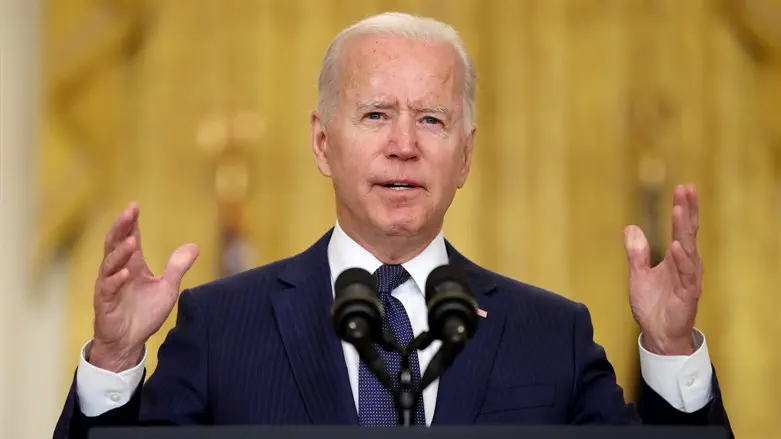
(JNS) It’s hard not to sympathize a bit with Israeli Prime Minister Naftali Bennett and his coalition partner Foreign Minister Yair Lapid. Despite their best efforts to make nice with the Biden administration, they are quickly catching on to the fact that despite all the happy talk being exchanged between Washington and Jerusalem, the United States is about to leave the Jewish state out on a limb with respect to the greatest threat to its security.
That’s the upshot of an Axios report that states that Biden’s National Security Advisor Jake Sullivan told his Israeli counterpart, Bennett’s National Security Adviser Eyal Hulata, that the United States is re-adjusting its goals for ongoing nuclear talks with Iran, which are scheduled to resume later this month in Vienna. Rather than stick to its position about wanting the Islamist regime to re-enter the already dangerously weak 2015 deal negotiated by the Obama administration, the Americans are already waving the white flag on that point—let alone their supposed long-term objective of getting Iran to agree to a new, stronger agreement that would fix the problems with the original Joint Comprehensive Plan of Action.
According to the report, which the publication claims was confirmed by both Israeli and American sources, the Biden foreign-policy team is afraid that the situation is getting away from them. What they are now proposing is an interim agreement that will serve as a way to stall for more time rather than actually pressing Tehran to rejoin the old deal or face the consequences. Indeed, consequences—or anything like holding Iran accountable for the way it’s moving inexorably towards its nuclear goal—are not on the table.
The terms of the proposal involve getting Iran to agree to freeze its nuclear enrichment at current levels, estimated to be at the 60-percent level, in exchange for “some frozen Iranian assets” and “waivers on sanctions.”
There are two problems with this.
One is that bribing Iran with billions in order to, as former President Barack Obama disingenuously noted at the time, get them to “get right with the world” hasn’t worked. More gifts to the ayatollahs along with reduced sanctions will only reinforce that lesson.
The other is that it grants legitimacy to Iran’s current rogue behavior in pushing ahead with enrichment. The JCPOA was a disaster for Western security, though it did place some limits on Iran’s uranium enrichment activity—up to 3.67 percent. In the last six years, it’s been obvious that Iran was cheating on that, but by legitimizing the 60-percent level, the United States would be rewarding them for violating the accord.
If we’ve learned anything about the way Iran negotiates, we know that Tehran will never agree to get below that figure. The same Axios report noted that Hulata pointed this out to Sullivan, saying there is no such thing as a temporary concession to Iran. Anything they get becomes a permanent asset that they never surrender at the negotiating table. But neither Sullivan, nor anyone else in the Biden administration, seems capable of learning from their mistakes. Nothing can divert them from their blind faith in appeasement, whose only apparent goal seems to be to achieve a rapprochement with Iran at any cost.
This repeats the same pattern of Iran negotiations that led to the original deal, which not only was a financial bonanza for the regime, but allowed it to keep its nuclear program and advanced research along with sunset clauses that would give it a legal path to bomb by the end of this decade. Having entered the original Iran talks in 2013 with all the cards in his hand as a result of tough international sanctions that he had been dragged into by Congress, Obama and then-Secretary of State John Kerry proceeded to react to each “no” from Iran by simply dropping the matter and moving on to some other point that the Iranians would, in turn, also bluff them into conceding.
The craven nature of the administration’s approach can’t be fully appreciated without also taking into account that Tehran’s recent behavior has demonstrated the kind of brazen contempt for Biden that shows just how little they think of American leadership.
As The Wall Street Journal reported earlier this week, Iran has resumed production of advanced nuclear centrifuge parts that would only make sense if it was preparing or operating a covert nuclear-weapons program. Moreover, the production is taking place at a plant in Karaj, where inspectors from the International Atomic Energy Agency have been denied access. Iran had halted production at Karaj in June due to what it called Israeli sabotage. But the new centrifuge parts production has increased since August, showing that whatever damage the Israeli efforts had caused has since been repaired.
Rather than threatening more sanctions or military action should Iran get even closer to its nuclear goal, the best Biden and his gang of Obama administration alumni who are back running things in Washington can do is to float the possibility of more concessions.
Just as bad is another report by Reuters, whose diplomatic sources say the Americans are solely focused on winning over the Russians and the Chinese, who were also parties to the original JCPOA to help persuade the Iranians to behave.
The expectation that the Chinese will help is a fantasy. The Chinese already signaled that they have Iran’s back by concluding a $400 billion economic agreement that gave Iran a market for its oil, as well as investment for improving its crumbling infrastructure. The Russians have also shown that they are more interested in chipping away at American security than in stopping Iran.
A year ago, American sanctions unilaterally imposed by former President Donald Trump after he withdrew the United States from the JCPOA put Iran on the defensive. He forced the Europeans to go along with his play by giving them no leeway for appeasement by making them choose between doing business with Iran or the world’s largest economy. Had that “maximum pressure” policy, which, in fact, still had room to be made much stronger, been continued, Iran could have been brought to its knees unless it agreed to negotiate a nuclear deal with no sunset clauses. That would not only prevent them from getting a bomb but also make them give up their status as the world’s leading state sponsor of terrorism.
But Biden’s only objective was diplomacy with Iran. That gave the Iranians all the leverage they needed. Nor is Tehran the slightest bit afraid of America punishing it for its provocations or a breakout to a nuclear weapon. And if they had any doubts about Biden’s weakness, his feckless and disastrous retreat from Afghanistan caused them to disappear.
That leaves Bennett and Lapid wondering what to do. Israel’s Saudi allies, who are under constant pressure from Biden for human-rights violations while the administration ignores those of countries not allied to the United States, are in a similar quandary.
It’s not like the former Prime Minister Benjamin Netanyahu, who failed to stop the original Iran deal, would be doing any better with Biden. The willingness of the current American leadership to give up on stopping Iran even before the nuclear talks restart puts the Israelis in the position of having to choose between standing by and watching Biden compromise their future by appeasing an existential threat to the Jewish state’s existence, and defying their sole superpower ally with their own efforts to stop Iran that are far from assured of success.
Whatever else Biden’s failures so far in office have achieved, the one indisputable consequence of his policies is to hand the only democracy in the Middle East an impossible dilemma with no easy choices or likely good outcomes.
Jonathan S. Tobin is editor in chief of JNS—Jewish News Syndicate. Follow him on Twitter at: @jonathans_tobin.
